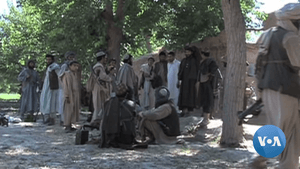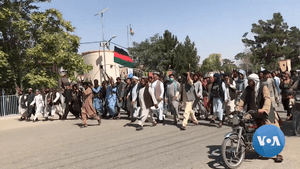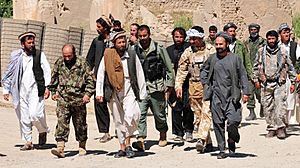Taliban facts for kids
The Taliban is a large Sunni Islamic fundamentalist militant group operating in Afghanistan. The group formed the government of Afghanistan from 1996 to 2001 and took military control of most of Afghanistan again in August 2021. Since the Fall of Kabul on 15 August 2021, the Taliban again has full control of Afghanistan.
Contents
History
In 1994 Taliban started a government in southern Afghanistan called the Islamic Emirate of Afghanistan. The first leader of the Taliban was Mullah Mohammed Omar.
The Taliban governed Afghanistan between 1996 and 2001. During this time, its leaders put in place the strictest forms of Sharia law ever seen in the Muslim world. Much criticism of the Taliban came from important Muslim scholars. For example, if a thief was caught stealing something the Taliban would cut off one of his hands so that he does not use it to steal again, no matter what it was that he stole. Many criminals were put to death without a fair trial and were executed in public. Anyone who refused to follow the law was considered a non-Muslim enemy. Every male had to go to mosque for prayer (except Afghan non-Muslims) during praying times, which is five times per day.
The Taliban became known around the world for their very bad treatment of women, denying them human rights. They also treated the Shia Muslim (who they consider heretics) and non-Muslim minorities (who are Hindus and Sikhs) very badly. Every form of art, music and entertainment was strictly banned under their rule, and sculptures, paintings, photos, cameras, televisions, etc. were destroyed. The Taliban also did cultural genocide when they destroyed the Buddhas of Bamiyan in February and March 2001, because they consider the display of human and animal figures a sin.
After the September 11 attacks in 2001, the United States invaded Afghanistan. The Taliban had been giving its ally al-Qaeda a safe base from which to operate. The United States government said that Osama bin Laden and al-Qaeda members did the attacks in the U.S. The Taliban asked the U.S. for proof of this before it would arrest them. The aim of the invasion was to remove the Taliban government from power, destroy al-Qaeda and capture bin Laden. After losing power in 2001, the Taliban had its headquarters in Pakistan.
In February 2020, the United States and the Taliban signed the Doha Agreement that would remove all U.S. troops from Afghanistan by May 1, 2021. President of the United States Joe Biden said that the U.S. exit from Afghanistan would start on May 1, 2021 and end by September 11, 2021, which would be exactly 20 years since the September 11 attacks.
On 15 August 2021, the Taliban captured Kabul and the Afghan government collapsed, with the Taliban taking control of most of Afghanistan. On 30 August 2021, the Taliban had took full control of the country and ending the War in Afghanistan, after the evacuations from Afghanistan ended.
Ideology
- Jihadism
- Islamic fundamentalism
- Deobandi Islamism
- Religious nationalism
- Pashtunwali
Economy
It is estimated that in 2020 the Taliban had an income of $1.6 billion, a big part of which came from illegal activities. Other sources of income include mining, taxes, donations (or gifts) and exports.
Taliban views on society
-
For more details, see Treatment of women by the Taliban
In the past, the Taliban had views on society that are stricter than those of many other Islamic countries:
They had the following rules for girls and women:
- Starting at age eight, girls and women must not be in contact with men who are not their direct family, or who they are not married with.
- Women must not be seen in public, without wearing a burqa, and without being accompanied by a male member of the family.
- They must not wear shoes with high heels.
- They must not speak loudly in public, so that no stranger can hear their voice.
- All windows on the ground floor and the first floor of the house must be sealed (or walled in), so that no one can see a woman in her apartment, when he passes by on the street.
- Taking photographs of women or making movies showing women is forbidden. This also applies to showing pictures of women in magazines, books, newspapers or in shops. This also applies to the own home.
- Placenames that contain the word "woman" must be changed (That way a "women's garden" became a "spring garden").
- Women are forbidden from using the balcony or garden of the place where they live.
- Women must not have access (or be featured in) radio, TV, media. They must not be allowed to attend public assemblies or meetings.
- Women can get education until they reach puberty; afterwards, they should get married, and care for their children.
Taliban violence against civilians
In their attacks, the Taliban also target civilians in Afghanistan. According to a report by the United Nations, the Taliban were responsible for over 76% of civilian casualties in 2009. In 2010, the Taliban were again responsible for over three quarters of the civilian casualties. Civilians are targets of Taliban attacks twice as often as forces of the Afghan government, or troops of ISAF.
In 2011, the Afghan Independent Human Rights Commission (AIGRC) said that Taliban fighters targeting civilians was a "war crime". Religious leaders condemned the attacks on civilans, saying they were against Islamic ethics.
Also in 2011, human rights organisations pressed the International Criminal Court in Den Haag, to start investigations whether the Taliban committed war crimes.
Human rights abuses
When they took control of the country, the Taliban promised an amesty to the fighters and officials of the former government. At the end of 2021, a few months after the Taliban taking control, Human Rights Watch, and other organisations have documented summary executions of these people. The United States, the European Union, and several other countries have therefore told the Taliban that they should keep the promise they gave.
Relationship with other countries
- Russia has had meetings with Taliban regularly, over the last years (since August 2021). Russia's ambassador (Dmitrij Zjirnov) had a meeting - in Afghanistan - with representatives from Taliban on 18 August 2021.
- United States. On 23 August 2021 the chief of CIA met with a member of the [ middle managment] of Taliban (Abdul Ghani Baradar); the CIA chief is the highest ranking member of Biden administration to have met with Taliban.
- Norway has had contact with Taliban as far back as 2007. For several years (as of 2021) Norwegian diplomats have been in contact with Taliban, at the (peace talks or) peace process in Doha (Qatar); as of 2021's fourth quarter, Norway still has diplomats at the peace talks in Doha.
Relationship with militant groups (outside Afghanistan)
Tehrik-i-Taliban
Tehrik-i-Taliban Pakistan operates in northwestern Pakistan and is sometimes called the Pakistani Taliban, but they are a separate group.
Before the beginning of Tehrik-i-Taliban some of its (later) leaders and fighters were part of the 8,000 Pakistani militants fighting in the War in Afghanistan (1996–2001) and the War in Afghanistan (2001–present) against the United Islamic Front and NATO forces. Most of them come from the Pakistani side of the Af-Pak border regions. After the fall of the Afghan Taliban in late 2001 most Pakistani militants including members of today's TTP escaped (home) to Pakistan.
Peace talks
At the peace talks in Doha, there is little or no progress (as of 2021's third quarter).
Leader (or Supreme Commander)
- Hibatullah Akhundzada (since 2016)
Images for kids
-
President Ronald Reagan meeting with Afghan Mujahideen leaders in the Oval Office in 1983
See also
 In Spanish: Talibán para niños
In Spanish: Talibán para niños






